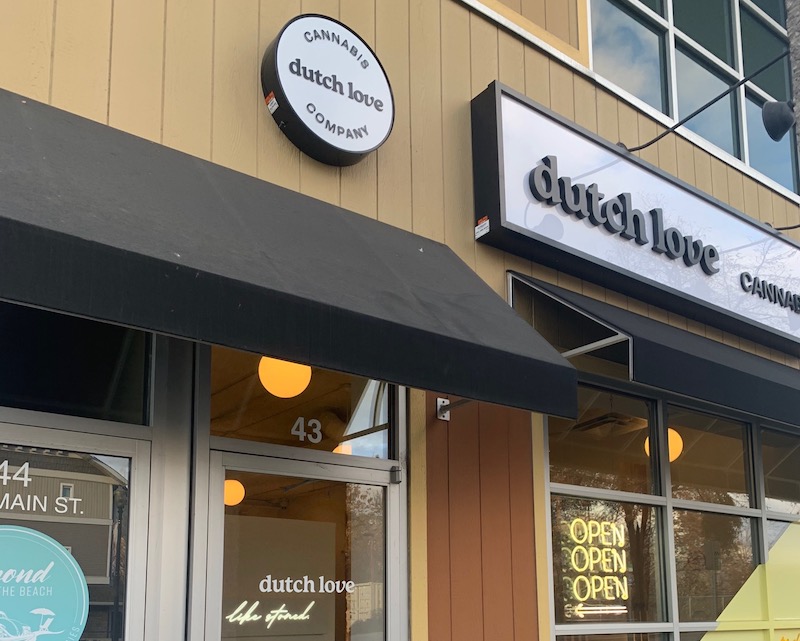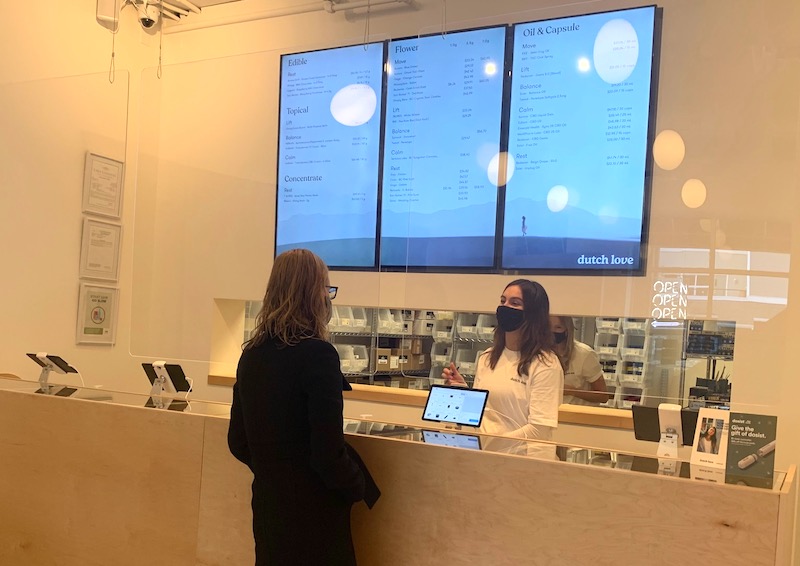Features
Q&A with VP of Dutch Love
Published on December 11, 2020 by David Wylie
 Photo: David Wylie/the oz.
Photo: David Wylie/the oz. We talked to Harrison Stoker, vice president at Donnelly Group (Dutch Love’s parent company).
In an industry that seems to operate in dog years, Stoker says the “masochist-level work ethic” within the company sets it apart.
“We run our stores the same way we run our pubs—that’s with a tremendous amount of attention to the bottom line,” he says.
In Part 1, below, Stoker talks to the oz. about what makes Dutch Love unique, what the company has learned from its experience in the hospitality industry and why they have been so successful in securing licences.
In Part 2, Stoker discusses his preferred strategy to combat the illicit market, the BC Cannabis Stores’ online monopoly, how the rebrand from Hobo to Dutch Love has gone, and the impact COVID-19 has had on the company.
the oz. — What makes Dutch Love distinct?
HS — A lot of other retailers were coming into this—call it ‘net new’—and building things from scratch. We were building our concept on the back of 20 years’ experience in hospitality. We took the DNA from our hospitality experience and we infused it into our retail customer experience and our people. I really think that sets us apart. I think there’s a real genuine sense of empathy that our people carry. This market demands that compassion. Thankfully we came into it locked and loaded with that in our DNA. As it relates to product, curation and our catalogue, it’s indifferent to that of our competitive set. We haven’t really reached that critical mass yet in market where we can genuinely curate product because we still need Health Canada to continue working with licensing producers. Anyone that calls that a point of difference is lying through their teeth. We certainly wouldn’t put ourselves in that boat.

Harrison Stoker
the oz. — What are some of the lessons that you’ve learned from the hospitality industry that apply to cannabis, more on the business side of things in this tight-margined industry?
HS — I think differentiating between those two things is important. On the business side, because the provinces where we operate, specifically British Columbia, the province is again the middle man—as it is in our liquor businesses. So in our pubs we purchase from the province for liquor, wine and beer, all the same as in cannabis retail we purchase from the province for our cannabis products. Because of that (and the markups and the taxes), the margins are pretty razor-thin. So from a business perspective we need to operate really diligently, really strategically. We took all of our learnings, two decades worth of learnings in hospitality, and built our business that way. That’s what enables us to stay competitive is how diligent we are in operating our stores. Whether that’s really tight labour and utilities, and negotiating good lease rates, and sourcing really good locations—all of those things really come to life in the business side of that, which is really important. It just sets the tone from day 1. This business, like our pub business, it’s a grind. It’s not raining money in cannabis, anyway. Anyone who thinks that’s the case is unfortunately very wrong. It’s really really hard work, but we like working hard, so we’re probably a really good fit for it in that case. It probably circles back to my original comment that we’ve got masochist-level work ethic, and that’s a by-product of us being publicans and in the hospitality business. You just have to be in order to run a successful business.
the oz. — Not to try to get in on any of your trade secrets, but you being the first store open in Kelowna and having a bunch of stores open in Vancouver—even that early store in Ottawa—how are you able to get provincial approvals so quickly? I’ve seen some businesses here in Kelowna, and I swear they’ve been waiting for a year and a half now… But you guys seem to have really almost a seamless way of doing it.
HS — Well, I wish it was seamless. I’d say that from the outside in… we could probably use that analogy of a duck gracefully gliding across the pond; if you’re looking at the duck from land, it looks like it’s graceful. But if you’re looking at it like a fish under the water, it’s flapping around like crazy. We have relationships with provincial regulators and distributors, but that certainly does not earn us any advantage over the guys that have been waiting a really long time. In cannabis, the provinces and the federal government were really hyper-scrutinized—what’s called the ‘fit and proper process of permitting’ you to be a retail cannabis operator—and a lot of that has to do with understanding your business, financial, and personal history, and obviously trying to ensure that there’s no criminal activity involved there. And so, I’d say that, without getting into specifics, a lot of people who are being very challenged by this process there’s a very high likelihood that fit and proper process is getting hung up on some of these elements.

For us, 21 years now experience in business (with many businesses by the way) with a clean bill of health as it relates to criminal activity and other things that would be red flags, we fit proper process and came out with a passing grade. But it took us just over nine months to get past that and so anyone that thinks that we’re racing through this doesn’t understand that we were just really prepared up front and got as many applications in as possible. We’ve been waiting for a lot of our places in excess of nine months and now we’ve gained some really good experience in the meantime opening now 20 locations in Canada and have been getting a better understanding of the process. Once we really passed that fit and proper component, getting the stores licensed up becomes a little more seamless—not seamless—but a little less friction. There’s no trade secret there at all, and I think the only difference between us and the people who have been waiting is perhaps first and foremost our fit and proper came out with a passing grade, and secondly we’re grinders. We don’t sit back and wait. We’re pretty irritating to our regulator partners and the squeaky wheel gets the grease if you will.
Even after 20 stores, we still don’t think we really get it. Thankfully in British Columbia they’ve put in some provisions like distancing, which is going to be incredibly important. We are observing in real time in provinces like Alberta and Ontario an element of saturation because they don’t have provisions like that. So you’re got clusters of stores opening within arm’s reach of each other. There’s no real sustainability for that model long term. But British Columbia took a much more conservative approach which will probably put it in a golden goose position eventually. It’s making the retail framework within the province incredibly valuable. A lot of the very large public-facing corporate chains have been very challenged by getting into this province. We’re from here. It’s our origin story. If we couldn’t be successful in our own backyard it was very unlikely we’d be successful anywhere.
—
Next time, in Part 2, Stoker talks about Dutch Love’s plans for combatting the illicit market, how the rebrand from Hobo to Dutch Love has gone, and the effect COVID-19 has had on its growth.
Leave a comment on our Facebook page.
© Copyright 2020 Okanagan Z. | About the oz.
Report a Typo or Inaccuracy
We strive to avoid typos and inaccuracies. However, on occasion we make mistakes. We value your contributions and help in correcting them.